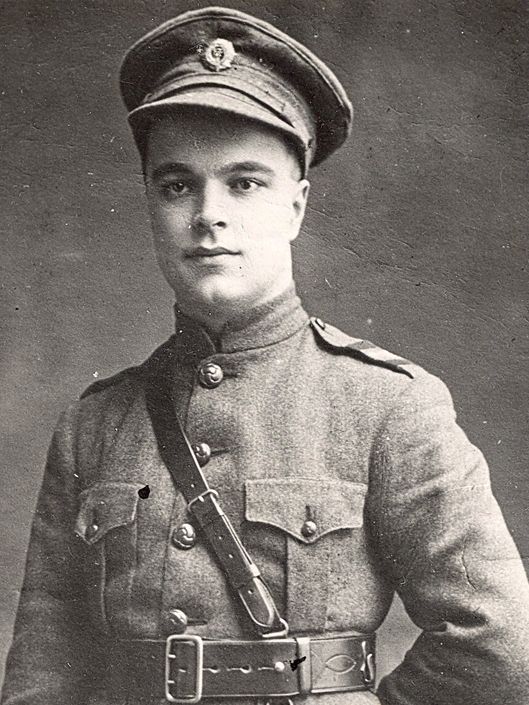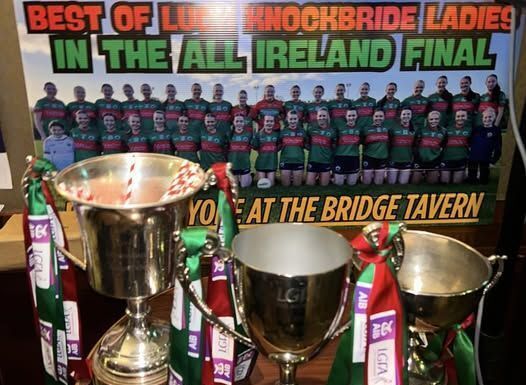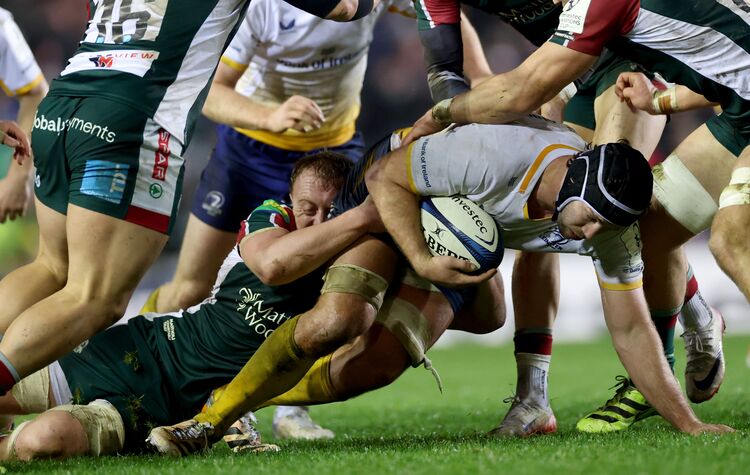“They were asked if they wanted to write a last letter to a close relative or friend. At 3 a.m., under the flickering gaslight, Joe wrote to his mother Rose.”
The author of those lines, James McVeigh, was referring to a man who was soon to be shot by firing squad. Because there was none previously, he undertook to write a book about the 24-year-old who died in Mountjoy Prison at 8 a.m., on Dec. 8, 1922. Its title is “Goodbye, Dearest Heart.”
If people know one thing about Ireland’s Civil War, it’s that Michael Collins was assassinated in an ambush when he was touring West Cork, on Aug. 22, 1922.
He’s also part of the story in the second and third best-known episodes of the conflict, as is McVeigh’s subject, the County Tyrone-born Joseph McKelvey: Collins ordered on June 28 the bombardment of the rebel republicans occupying the Four Courts in Dublin in defiance of the government, and five months later, on the morning of Dec. 8, four of the anti-Treaty IRA leaders captured at the time were executed by order of the Cabinet.
In September, partly as a response to the killing of Collins, the country’s preeminent military and political leader, the Provisional Government passed emergency powers legislation, which allowed for opponents captured with unlicensed weapons to be tried by a military court and sentenced to death.
By late November, the government had shown it was deadly serious. Erskine Childers, who had in his possession a pistol that had been given to him in friendlier times by Collins, was executed on Nov. 24.
IRA Chief of Staff Liam Lynch’s reply to that and other executions was to declare that anyone who had voted in the Dáil for the “murder bill” — which he saw as permitting the killing of captured soldiers — would be shot on sight as a matter of policy.
On Dec. 7, two such TDs were shot, and one of them, Seán Hales, died. The Cabinet acted swiftly. This time there would be no military court, nor any legal appeal of the sort Childers had pursued. Dick Barrett, McKelvey, Liam Mellows and Rory O’Connor were shot the next day at 8 a.m., explicitly as a reprisal for Hales’s death, and as a warning.
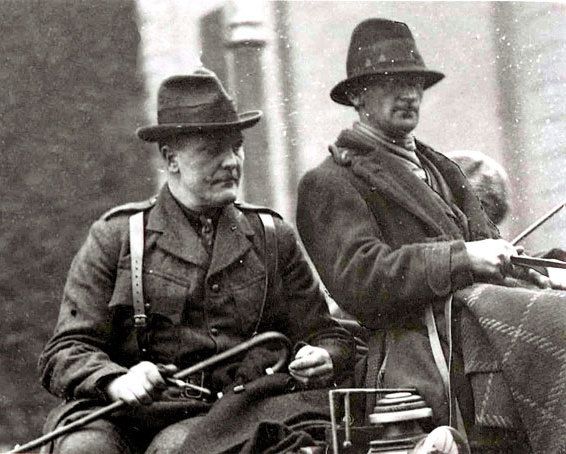
Seán Hales TD pictured, left, on the day of his assassination, Dec. 7, 1922.
McKelvey’s background was in most respects typical of the young men who became senior officers in the anti-Treaty IRA, except one: his War of Independence service had taken place in the maelstrom of Belfast, with its complicating factor of ethnic division often spilling over into inter-communal violence. As leader of the Belfast IRA, he was rather more sensitive than his lieutenants to the reality that certain operations might be perceived as sectarian. As it happened, the more gung-ho and militant officers would in time fall in behind Collins and his position. McKelvey was pushed aside by the Treaty and he moved to Dublin.
Joseph McKelvey was born on June 17, 1898, in No. 8, The Square, Stewartstown, Co. Tyrone to Rose and Patrick McKelvey. Patrick was a Royal Irish Constabulary constable stationed in Springfield Road Barracks, off the Falls Road in West Belfast; Rose was the postmistress in Stewartstown.
“We know little of Patrick and Joe’s paternal family,” writes McVeigh, whose first novel was published in 2022 (see here), “other than he was born and reared in Doochary, County Donegal. Doochary or An Duchoraidh, meaning the black weir in Irish, lies in the middle of West Central Donegal close to the Derryveagh Mountains. The Gweebarra River runs from Gweebarra Bay through the picturesque village and on a further six miles to the Atlantic Ocean. The village to this day remains a part of one of the few remaining Gaeltacht communities on the Island. Joe’s father would have been a fluent Irish speaker and appears to have passed a knowledge of the language onto his only child.”
The boy’s maternal Hugh O’Neill, a well-known educator, was another influence.
Eventually both parents and their son were living in West Belfast, where Joe became involved in various nationalist organizations, from the GAA to Na Fianna Eireann.
Meantime with the start of the Great War in Europe, the now Sergeant McKelvey volunteered by enlisting in the special reserve of the British army. He was posted to the Northumberland Fusiliers, but served in home defense roles in Belfast. In August 1919, Patrick McKelvey died in hospital at age 57 of a perforated stomach. Rose and his only child, Joe, were at his bedside.
Young Joe was at this time moving up, and would go higher, thanks to promotions awarded by the same leaders he eventually opposed in arms.
More generally he’d been acquainted as a youth and a young man with many prominent people in the militant nationalist movement in Ulster who took a different line to his on the Treaty. Denis McCullough, the official head of the Irish Republican Brotherhood, was one. Another, though, Cathal O’Shannon, a Labour Party TD in 1922, declared himself a “neutralist” in the Civil War and described the executions of the four on the morning of Dec. 8, as "the greatest crime...committed in Ireland within these last 10 years.”
If McKelvey was outnumbered in Belfast and Ulster in the movement by supporters of the Treaty, Michael Collins was in a similar position vis a vis activists in his own native Cork; but Seán Hales, the first-born son of a prominent republican family, backed him. Hales’s brother Tom, in contrast, led the anti-Treaty forces in his and Dick Barrett’s home area. That Barrett was friends with the assassination victim of Dec. 7 is just one aspect of the Dec. 8 executions that highlights the intimacy of the Civil War. The best known is that Rory O’Connor acted as Cabinet Minister Kevin O’Higgins’s best man in 1921.
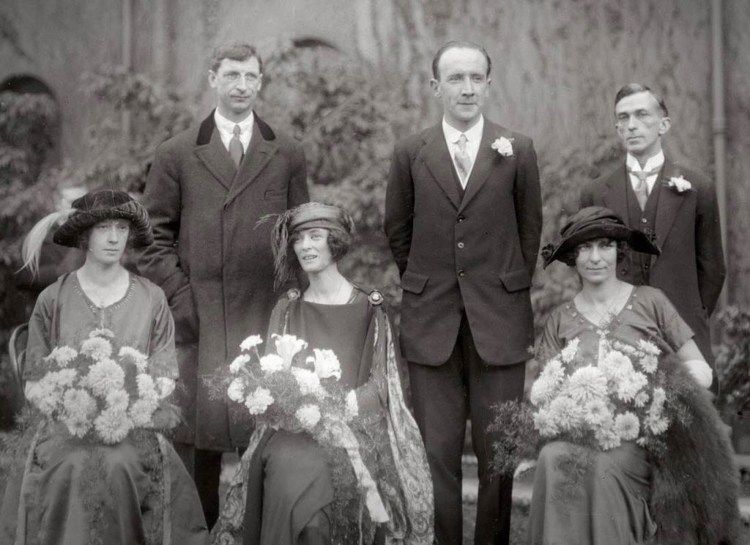
Kevin O’Higgins, standing center, on his wedding day. Eamon de Valera is on the left, and the best man, Rory O’Connor, on the right.
The officer commanding the firing squad was Col. Hugo O’Neill, who at 22 was even younger than McKelvey. His uncle was Cabinet Minister Eoin MacNeill, two of whose sons were also in the National Army, while a third, Brian MacNeill, joined the anti-Treaty IRA in County Sligo and had been killed in disputed circumstances in September. Ten years ago, grandson of Eoin MacNeill and former Tánaiste Michael McDowell said in an RTE documentary he believed his uncle and five comrades were unarmed and surrendering when they were shot, and that the Free State troops involved covered it up.
Accompanying Col. MacNeill on the morning of Dec. 8 was Col. Hugh Gunn, whom McKelvey knew as a friend and comrade from the Belfast IRA.
It would take a novelist maybe to tell the story, and one was there to witness part of it, Peadar O’Donnell, who described the youngest of the executed men thus: “Joe McKelvey was a Belfast man of Donegal stock. He was sturdy in build, of enormous strength and reckless courage. He was an unyielding opponent but not a dangerous enemy for he was quite incapable of deep hatreds. He was pre-destined to be a martyr in a revolutionary movement that failed for he would not dodge and he could not bend.”
A novelist had been executed on Nov. 24, 1922. Childers’s “The Riddle of the Sands,” published in 1903, was very popular in the years leading up to World War I. Ken Follett has described it as the “first modern thriller.” But another novel from the time eerily makes an appearance in the story of Dec. 7 and 8, 1922. “The Gadfly,” by Cork-born British writer Ethel Voynich, and issued in 1897, was set in the Italian revolutionary upheaval of a few decades before. Twenty-five years after publication it was still enormously popular, but especially with revolutionaries and sympathizers of various types of revolution.
The following are excerpts from “Goodbye, Dearest Heart: The Life and Times of Lt. General Joseph McKelvey” by James McVeigh.
December 7th, early evening. Joe shared a cell with Liam Mellows, both of them were now close friends as well as trusted comrades. Peadar O’Donnell who knew both men and was imprisoned with them in Mountjoy recalls a disturbing and prophetic conversation with Joe just the evening before his execution:
“It is a curious fact, which many of the Mountjoy prisoners must be easily able to recall, that it was around these days that ‘The Gadfly’ was being widely read in ‘C’ wing; it is a tale of the Italian revolution with a ghastly execution scene. And on McKelvey this book made such a deep impression that he often commented on it and expressed the hope that ever he had to face the firing squad his killing would be more efficiently carried out than in the case of the Gadfly.
[O’Donnell reproduced some lines about the botched execution from “The Gadfly,” which ended, “For the first moment soldiers and officials stood as if they had been turned to stone, and watched the ghastly thing that writhed and struggled on the ground…” He then continued his recollections.]
“At the end of our talk in the cell we turned to talk of executions outside for we discussed them often in search of the policy that would end them. We knew that the IRA headquarters had ordered the execution of the TDs who had voted for the ‘Execution Act’ but I do not think we made any reference to that order. But I distinctly remember McKelvey rolling over on his side, picking up ‘The Gadfly which was nestling in a little stock of books and saying once more: ‘God, I hope they don’t mess up any of our lads this way.’ McKelvey was to get time to remember ‘The Gadfly’ next morning.’”
*****
Later that afternoon when news of the killing seeped into the prison, Barrett took the news badly, exclaiming vehemently [about Seán Hales] “Ah shag him, why did he join them?” That evening prison life continued as normal. Mellows played violin in his cell. A distance away O’Connor sat quietly playing chess with another comrade. O’Donnell passed the cell and paused to tell Mellows a joke, who chuckled. Hearing the laughter, Joe asked what the joke was and as he turned down his bed, listened to Mellows repeat the joke. Evening curfew approached with the sound of laughter floating across the floors. “Get into your cells, ‘C’ wing,” shouted the guards, as both prisoners and soldiers settled down for another night of whispered conversations and restless sleep.
*****
In the dark hours of Friday morning the Dec. 8, Joe McKelvey, Liam Mellows, Rory O’Connor and Dick Barrett, were woken from their sleep by armed guards and the Deputy Governor Paudeen O’Keeffe. They were told to dress and to pack their meagre belongings but they were given no hint of what was to come. Joe piled his little collection of books into a pillowcase, including ‘The Gadfly,’ and threw them over his shoulder as he left. Most likely they believed that they were being moved to another part of the prison or indeed another location. They were moved to another wing without any disturbance or commotion from the other prisoners, who like Peadar O’Donnell continued to sleep through their removal. They were each placed in a cell alone. O’Keeffe entered each in turn, handed each man a document which informed them that they were to be shot at 8am in reprisal for the killing of Seán Hales:
“You Joseph McKelvey are hereby notified that, being a person taken in arms against the government, you will be executed as reprisal for the assassination of Brigadier Seán Hales TD in Dublin on December 7th, on his way to a meeting of Dáil Eireann and as a solemn warning to those associated with you who are engaged in a conspiracy of assassination against the representatives of the Irish people.”
[McKelvey composed his final letter.]
“My Dearest, Dearest Mother,
How can I tell you the news I have to let you know. I don’t care at all for my own sake, but I grieve for the pain it will cause you, my loving mother. A document has just been read to me informing me that, as a reprisal for the shooting of Sean Hales I am to be executed at 8am, this morning. I can honestly tell you, that the news hasn’t upset me one little bit, and I only hope I shall face the firing squad with equal equanimity. Liam Mellows, Rory O’Connor and Dick Barrett are, I think, to go along with myself, at least they have been brought out with me. I haven’t yet seen the chaplain, but he is to be brought to me, however. I feel quite happy, and I hope God will accept my sacrifice for himself. I feel very much the fact that it is my own country men who have sentenced me to death, but I pray God that the deaths of those of us who are to be executed this morning may open their eyes to the dreadful crime of going against their own better natures, against everything they once held dear, and at the bidding of our one enemy, England, waging such cruel and relentless war against the Republic which once they would have died to uphold.
Now, Mother, as the time is growing short, and as I want to see my comrades before we go, I must draw to a close. So good-bye, good-bye, dearest heart, and god bless you and keep you, my Mother. Give my heart's love to all friends. Pray for me dearest.
Your loving son, Joe.”
******
Only a select few were aware of the impending executions. The then Archbishop of Dublin Dr Edward Byrne spent the early hours trying to persuade W.T.Cosgrave, the head of the Free State cabinet, to reverse the decision of the government, but his pleas fell on deaf ears. After the executions he wrote to Cosgrave:
“…….the policy of reprisals seems to me to be not only unwise but entirely unjustifiable from the moral point of view. That one man should be punished for another’s crime seems to me to be absolutely unjust.”
All four were brought to the prison chapel to hear mass. McKelvey, O’Connor and Barrett received Holy Communion but Mellows did not, Mellows had been asked to repudiate the Republican cause by the priest and had refused. They left the chapel in single file, led by Mellows, with O’Connor at the rear. When they entered the hallway, they were blindfolded. Canon Pigott, one of the priests in attendance who was there at O’Connor’s request, intervened and took Mellows back to one of the cells and after a short delay, he too received Holy Communion. He held a little crucifix in his hand and asked Cannon Pigott that it be returned to his mother after his death.
Once again they were blindfolded and led to the prison yard together. Dick Barrett, struck up the song, “The Top of the Cork Road,” as they were positioned beside one another in a row. “Here’s a health to you, Father O’Flynn, Slainte and Slainte and Slainte agin…” Their hands were tied behind their backs and a target pinned over each of their hearts. Mellows bid the lads “Slán Libh.”
They faced a firing squad of twenty Free State soldiers, lined up in two rows of ten, one row kneeling in front of the other…Four parties of five soldiers were instructed to fire on a different prisoner in order to ensure that each were killed. The order was given “Fire!”
The results were tragically shambolic. For some reason, most of the soldiers fired on Rory O’Connor and he was struck that many times that his clothes caught fire. The gruesome sight sent some of the soldiers into confusion and panic. O’Connor was the only one to be killed immediately, the other three were gravely wounded, though only Joe McKelvey remained conscious.
McNeill and Gunn stood by to deliver the coup de grace and after some confusion and hesitation moved among the dying prisoners finishing them off. Canon Pigott and Canon McMahon anointed three of the men but heard Joe call out, “give me another one,” McNeill fired a shot into McKelvey’s chest but once again missed the heart, Joe called again “and another” before being finished off with a shot to the head.
Dorothy McArdle who was being held in the women prisoner’s wing in Mountjoy, recalled hearing the first volley of shots closely followed by nine single shots. As Canon Pigott made to leave the prison, he remembered Mellows request to deliver the small crucifix to his mother. He returned to where the bodies still lay and found the crucifix lying close to Mellows body. On leaving the prison, he made straight to the home of Mrs Mellows and broke the horrible news of her son’s death to her.
Their broken bodies were then transferred to another part of the prison, placed in coffins and buried in four unmarked graves. That morning the prisoners made their way to mass, as it was a holy day. It was here that their comrades were told the grave news by Canon McMahon. Peadar O’Donnell recalled the moment: “I got the news in the door of the chapel. I just went wooden. I was completely dried of all feeling. I saw men sob and I heard men curse but the whole chapel was detached. I didn’t kneel during mass. The priest had said before turning to the altar to begin: ‘We will offer this mass for your four comrades who have gone before their God.’”

